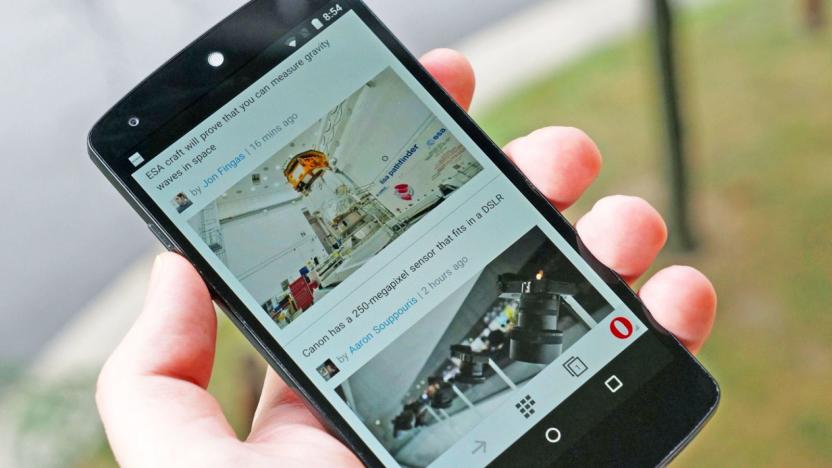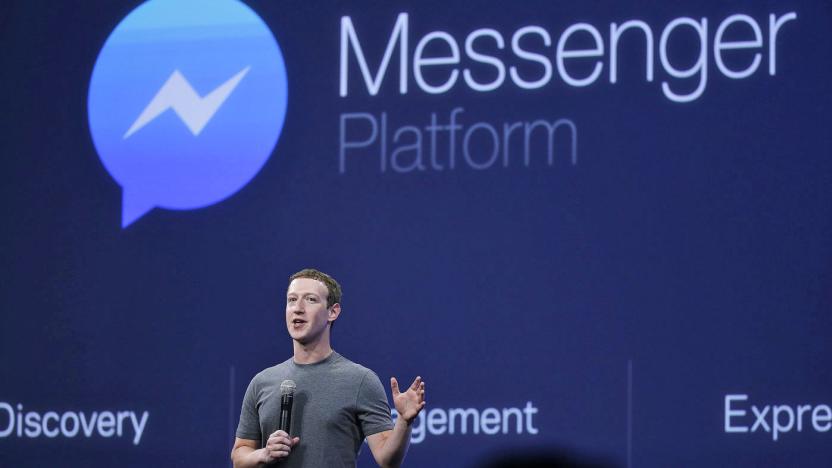mobileweb
Latest

Google gives devs a way to prove they can build fast mobile sites
Google hasn't been shy about promoting its vision of faster mobile web browsing. The company's Accelerated Mobile Pages (AMP) project is focused entirely on developing "light-weight" mobile sites that load more quickly on phones and tablets. Now, it's giving developers a way to show off their efficient design skills with the Google Mobile Sites certification. After reading up on the company's design guidelines and passing an exam, devs will snag a certification on their Google Partners profile.

Facebook shoves mobile web users toward the Messenger app
Remember when Facebook divorced instant messages from the main app and forced folks to download Messenger if they wanted a direct way to send quick missives while on the go? Well, the social network is doing something similar once again. Reports are floating about that people accessing their messages from the mobile web either isn't possible or that there are a few annoying obstacles in place.

Google wants to make mobile web browsing faster
Let's face it: a lot of those beautifully-designed websites, feature articles and media don't translate well for those browsing on a mobile device. To improve the speed and efficiency of the mobile web, Google has announced the Accelerated Mobile Pages (AMP) Project. Through the initiative, Mountain View is looking to leverage existing HTML tech to help publishers build "light-weight" sites that load faster, even if they contain video, animations, slideshows and other items that typically require significant bandwidth. "We also want the same code to work across multiple platforms and devices so that content can appear everywhere in an instant," a blog post announcing AMP explains. Google has already used AMP's HTML open framework for Search and its other apps/services (like News) could see the tech as well. The company already has around 30 publishers on board, including Twitter, Pinterest, WordPress and LinkedIn. Of course, Google isn't the only one improving mobile browsing as Facebook varies how your News Feed loads based on your connection.

Google Wallet checkout gains support for mobile websites
It wasn't long ago that Google Wallet delved into the online payment sphere, but as of today, the Mountain View juggernaut has extended its checkout service to mobile websites. According to Google, 97 percent of mobile shoppers abandon their carts, which is primarily due to the litany of information that needs to be manually entered. Now, when you stumble upon a mobile website that supports Google Wallet checkouts, you'll merely need to click the buy button, enter your login credentials and then complete the order. The immediate downside is the paltry number of outlets that support the service: 1-800-Flowers, Rockport and Five Guys. Then again, we suppose you could have a pretty nice evening with flowers, new shoes and a couple of burgers.

Google mobile web revamp brings hidden sidebar, feels all too familiar
Google+ has it. Facebook has it. Even Spotify and Evernote have it. "It" is the hidden sidebar, and that subtle if over-repeated interface has spread to Google's mobile home page. Visit from an iOS or Android device and the front end will resemble the desktop web version, but with a sidebar that exposes Google's services in a more elegant way than the top bar we've had to use before. The redesign isn't showing for everyone as of this writing, so don't be disappointed if Google's new drive towards interface consistency isn't available yet. Just know that there's one less refuge from the trendiest input metaphor of 2012.

Google Handwrite lets us scribble our way through mobile searches (video)
Not eager to hunt and peck on a keyboard? Google Handwrite is here: the search engine's mobile pages will now let you draw letters on the page to conduct searches with the writing method you learned before this whole computer fad took hold. There's no special plugin required -- it's just the flick of a settings switch. As long as you've got an Android 2.3 or later phone, an Android 4.0 tablet or an iOS 5 device of any sort, you can immediately remind yourself of just how much you've forgotten about handwriting since elementary school while you're searching for the local sushi restaurant.

Gmail brings Priority Inbox to mobile web app, stymies green-eyed monster
Those of you suffering from Android envy can put your jealousy aside momentarily, because Priority Inbox is now available via Gmail's mobile web app. Up until now, the mail sorting system was available for the desktop and Android devices only, but now smart email prioritizing is anybody's game. If you didn't already know, Priority Inbox sorts emails in order of importance by learning from your actions, like how many times you read or reply to messages from a certain address. Mobile web users were always able to dig up those sorted messages with the "Important" label, but now all the good stuff is front and center. The feature is available right now on most HTML5-compatible browsers for devices running Android 1.5 and iOS 3.0 or higher, and while it may not be the great equalizer, it's bound to quell some feelings of OS inadequacy. We'll chalk it up as a win for the little green monster (and a loss for his green-eyed friend).

Opera Mobile coming to Android within a month, bearing hardware acceleration and pinch-to-zoom
Forget all that Mini stuff, Opera is bringing its full-flavored mobile browser to Android some time very soon indeed. To tempt people on board, the new software will support hardware acceleration for buttering up frame rates while you zoom around at potato-scalding speeds, while pinch-to-zoom will also be implemented in a big O Android browser for the first time. Opera Mini will be partaking in the latter upgrade as well, while Opera Mobile proper is expected to make its debut on the Android Market at some point over the next month. All versions of the "well diversified" OS are supported too! [Thanks to everyone who sent this in] Update: Opera has clarified that the first Android beta of Opera Mobile will have pinch-to-zoom and will arrive some time over the next month, but won't be bringing hardware acceleration with it. That'll be a feature for a later date.

Google Instant on a Motorola Droid 2, hands-on
Google's new hotness is likely invading your desktop web search right now, but what's Instant search like on a smartphone? We got a good look at a Verizon-based Droid 2 running a prototype version of the auto-complete engine on both WiFi and 3G, and we're happy to say it's just about the same -- assuming you've got a decent connection and a reasonable amount of screen real estate. As you can see immediately above, you're only getting three Instant results under the search box here, as opposed to the desktop version's five, and between Android's notifications bar and the native keyboard auto-complete bar, you can only see a single result without scrolling down -- and honestly, this isn't going to be all that useful at a glance if you're relying on a screen-sucking virtual keyboard. The system was speedy enough, however, pulling down not only text queries but also Google Image thumbnails as well, and worked about as quickly as a standard mobile Google run without having to hit a button to complete our search. (The prototype did stop working and had to be restarted when we lost our 3G bars. ) A Google product manager told us it should work in any AJAX-capable mobile browser, and is presently in testing on Android and iPhone, with BlackBerry in consideration given the more-capable OS 6 browser. Expect to see it hit smartphones near you this fall.

Android accounts for one-quarter of mobile web traffic, says Quantcast
It's terribly difficult to get reliable statistics, as numbers tend to vary drastically depending upon whom you ask, but if you're inclined to believe that Android is mopping up Apple and RIM's declining mobile mindshare in the US, you'll find nothing but corroboration from Quantcast. The analytics firm reckons a full one-quarter of mobile web traffic stateside comes from devices running Google's OS, though it's important to know that the iOS tallies apparently don't include the web-friendly iPad. You also might want to note that this is mobile web traffic here -- these days, we spend an increasing amount of our internet time in apps -- and since we're on a roll with the disclaimers, let's just add that these numbers have nothing to do with a company's financial success. Nokia can attest to that.

Opera Mini users increased 4.2 percent in a month (and other interesting tidbits), says Opera
Opera's just released its State of the Mobile Web report for May of 2010, and its touting its continued growth in the space, with Opera Mini usage increasing 4.2 percent over the previous month, and a 7.2 percent gain in overall page views. Good news for them, undoubtedly, but they also have interestingly found that the hours 8:00 pm and midnight are the biggest for browsing -- unless you live in the UK, where you're just as likely to browse in the earlier hours. Nerds. Hit up the source link for the full report.

FCC gives Verizon the third degree over $350 'advanced device' ETF
Early termination fees have always represented the flipside of subsidized pricing -- the necessary evil that keeps free phones free. Thing is, they were tough enough to swallow at $175 or $200, but Verizon's recently gone for the jugular in a hell-bent effort to keep subscribers locked in by upping the fee on vaguely-defined "advanced devices" (read: any phone a power user would ever want) all the way up to a mind-bending $350. Turns out the FCC is as confused and worked up as everyone else, though, having fired off a 4-page communique to Verizon's veep of legal and external affairs today asking how customers are notified of the new ETF, how the prorating formula is calculated (hint: they don't like that you still pay $120 after 23 months of a 24-month contract), and how an "advanced device" comes to be, among other things. Riding on the letter are a few extra questions about inadvertent mobile web charges for customers that aren't signed up for a data plan, totaling nine paragraph-long queries that the feds want answered by December 17. Your move, Verizon. [Thanks, Daniel P.] %Gallery-79591%

Verizon "Mobile Web" service currently down
We've been getting a slow trickle of tips telling us that Verizon's Mobile Web service is currently down nationwide, with no ETA on a fix. That's Mobile Web, the featurephone service, not, you know, big-boy data, so chances are you're fine -- our various VZW smartphones are unaffected. (Although we did have a dropped call and some spotty voice quality on a DROID this morning -- ruh roh.) We'll let you know if we hear further. [Thanks to everyone who sent this in]

W3C finally publishes Mobile Web Best Practices 1.0
Okay, so we saw W3C's Mobile Web Best Practices offered up in "near-final form" in June of 2006, but we're just now (August of 2008, for those parked under a rock or tuning in from a parallel universe) seeing a final release. Talk about taking their sweet time. Hopefully said document has been updated over the past two years, and hopefully webmasters will grab hold and actually implement some of the suggestions. In essence, these guidelines seek to make web browsing easier on more handsets, but we're still in dire need of more robust browsers before any server-side tweaks make a noticeable difference.[Via the::unwired]






